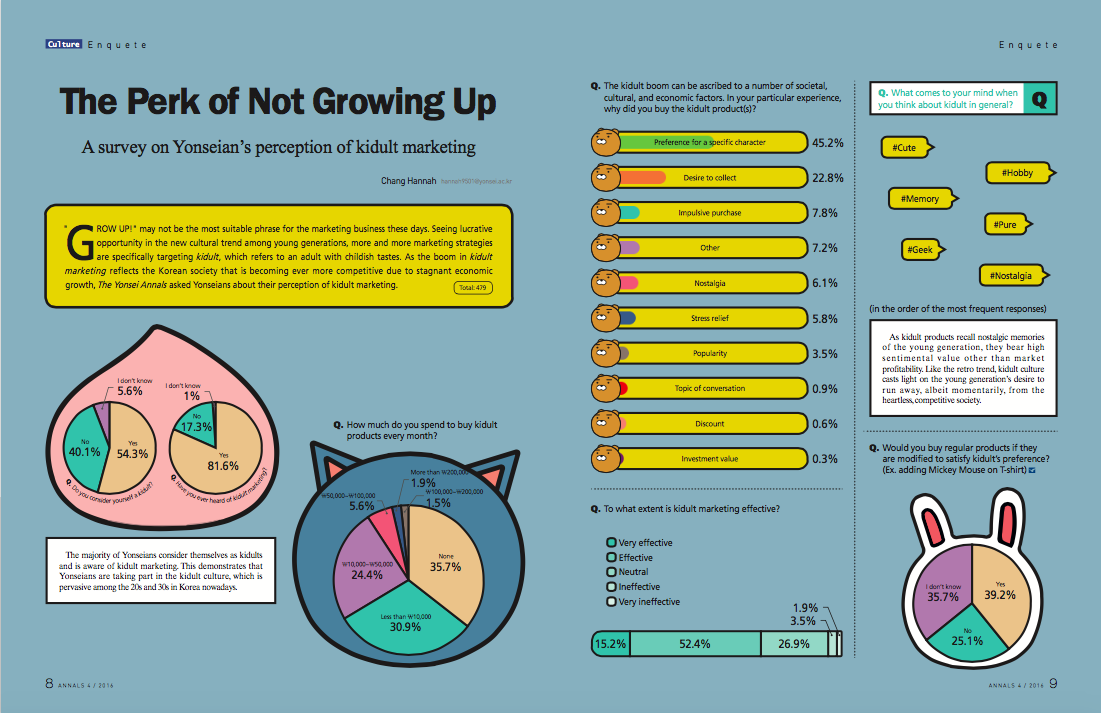A survey on Yonseian's perception of kidult marketing

“GROW UP!” may not be the most suitable phrase for the marketing business these days. Seeing lucrative opportunity in the new cultural trend among young generations, more and more marketing strategies are specifically targeting *kidult*, which refers to an adult with childish tastes. As the boom in *kidult marketing* reflects the Korean society that is becoming ever more competitive due to stagnant economic growth, *The Yonsei Annals* asked Yonseians about their perception of kidult marketing.
Total: 479
1. Do you consider yourself a *kidult*?
Yes: 260 (54.3%)
No: 192 (40.1%)
I don’t know: 27 (5.6%)
2. Have you ever heard of *kidult marketing*?
Yes: 391 (81.6%)
No: 83 (17.3%)
I don’t know: 5 (1%)
The majority of Yonseians consider themselves as kidults and is aware of kidult marketing. This demonstrates that Yonseians are taking part in the kidult culture, which is pervasive among the 20s and 30s in Korea nowadays.
3 The kidult boom can be ascribed to a number of societal, cultural, and economic factors. In your particular experience, why did you buy the kidult product(s)?
Preference for a specific character: 157 (45.2%)
Desire to collect: 79 (22.8%)
Impulsive purchase: 27 (7.8%)
Other: 25 (7.2%)
Nostalgia: 21 (6.1%)
Stress relief: 20 (5.8%)
Popularity: 12 (3.5%)
Topic of conversation: 3 (0.9%)
Discount: 2 (0.6%)
Investment value: 1 (0.3%)
4. How much do you spend to buy kidult products every month?
None: 171 (35.7%)
Less than 10,000: 148 (30.9%)
10,000~50,000: 117 (24.4%)
50,000~100,000: 27 (5.6%)
More than 200,000: 9 (1.9%)
100,000~200,000: 7 (1.5%)
5. What comes to your mind when you think about kidult in general?
Cute, Memory, Nostalgia, Hobby, Geek, Pure, (in the order of the most frequent responses)
As kidult products recall nostalgic memories of the young generation, they bear high sentimental value other than market profitability. Like the retro trend, kidult culture casts light on the young generation’s desire to run away, albeit momentarily, from the heartless, competitive society.
6. To what extent is kidult marketing effective?
1. Very effective: 73 (15.2%)
2. Effective: 251 (52.4%)
3. Neutral: 129 (26.9%)
4. Ineffective: 17 (3.5%)
5. Very ineffective: 9 (1.9%)
7. Would you buy regular products if they are modified to satisfy kidult’s preference? (Ex. adding Mickey Mouse on T-shirt)
Yes: 188 (39.2%)
No: 120 (25.1%)
I don’t know: 171 (35.7%)
Chang Hannah
hannah9501@yonsei.ac.kr

